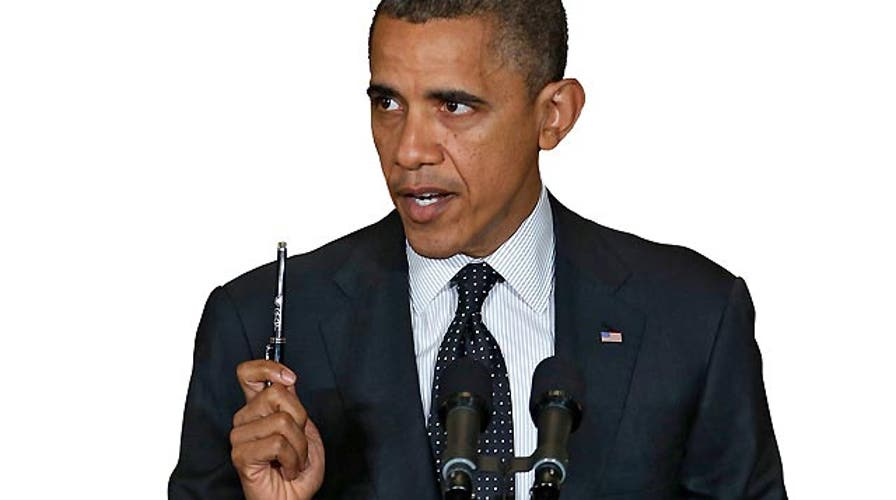Abuse of power in the name of gender equal pay?
President Obama used his executive powers to prohibit federal contractors from retaliating against workers who discuss their pay and boost transparency surrounding pay equity. But is it all politics?
As President Obama ordered new changes for federal contractor compensation practices in a bid to boost transparency surrounding women's pay, his top spokesman defended the pay disparities that still exist between men and women working at the White House.
The president, during an event Tuesday at the White House, signed an executive order prohibiting federal contractors from retaliating against workers who discuss their pay. He also directed the Labor Department to issue new rules requiring federal contractors to provide compensation data that includes a breakdown by race and gender.
"Pay secrecy fosters discrimination," Obama said.
But as Obama tried to shed light on federal contractor compensation practices, White House Press Secretary Jay Carney defended the apparent pay gap among White House staff.
An analysis of staff salaries done last fall by the conservative American Enterprise Institute found the president's female aides were paid 88 cents for every dollar paid to men, about $65,000 to $73,729 annually. On Monday, Carney argued the comparison is based on aggregate wages that include the lowest salaries at the White House "which may or may not be -- depending on the institution -- filled by more women than men."
He said men and women in equivalent roles at the White House earn the same amount and that 10 of 16 department heads are women, earning the top White House salary of $172,200.
Still, that reasoning -- that men and women are doing different jobs -- is similar to the argument made by business groups when explaining why a gender gap still exists in the rest of the U.S. economy. Census Bureau figures show that the annual earnings of women were 77 percent of what men earned in 2012, a difference that has barely budged over the past decade.
Obama, though, said at the White House event that women generally would have to work three more months to earn what a man earns in a year. "It's not right," he said.
The event at the White House was timed with the Democrat-controlled Senate this week planning to take up legislation that would make it easier for workers to sue companies for paying women less than men because of gender.
The legislation, like Obama's narrower executive order, would forbid companies from punishing workers who share salary information and would allow punitive and compensatory damages in lawsuits
Backed by business groups, Republicans are expected to block the bill when the Senate holds a showdown vote, probably Wednesday. The GOP derailed similar legislation in the Senate the past two election years, 2012 and 2010.
Even so, Democrats are pushing the bill, sponsored by Sen. Barbara Mikulski, D-Md., as part of a campaign-season agenda designed to contrast their efforts to help middle-income voters with Republicans and to motivate pivotal Democratic-leaning voting blocs like women.
Underscoring the politics behind the efforts, Democrats were aggressively soliciting campaign contributions, accusing Republicans of standing in the way of pay equity. Democratic Sens. Jeanne Shaheen of New Hampshire and Chris Coons of Delaware, for instance, issued emails Tuesday drawing attention to the pay gap and directing supporters to a contribution site that was compiling contributions for House and Senate Democrats.
Republicans argued through their campaign committees that the Senate legislation would hurt women by restricting job flexibility and merit pay.
"Why is it that so many Republicans are content to allow a woman working the same hours and the same job to make less money than her male co-worker?" Majority Leader Harry Reid, D-Nev., said as the Senate began debating the bill Tuesday. "It's hard to comprehend."
Senate Minority Leader Mitch McConnell, R-Ky., did not specifically address the legislation. But he said the Democrats' recent congressional agenda shows they are "a party that's out of ideas, campaign-obsessed and utterly beholden to the far left."
The U.S. Chamber of Commerce, the National Retail Federation and 22 other business groups sent a letter to Senate leaders Friday stating their opposition to the Senate bill. They said it could outlaw some ways companies set salaries, such as paying more for professional experience or hazardous work, and entitle workers suing their employers to exorbitant penalties.
The Associated Press contributed to this report.





